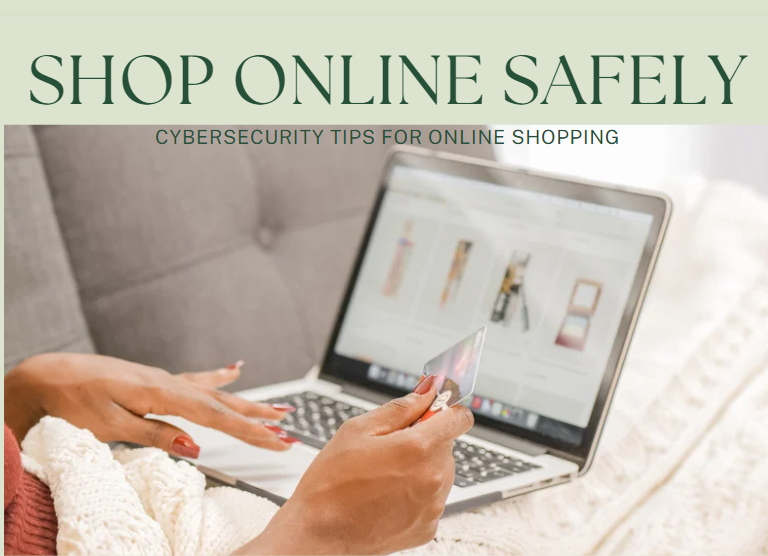
Shop Online – Safely and Securely
In this blog, we provide you with proactive measures you can take to prevent the probability of becoming a victim of cybercrime. The increased use of online shopping has been a transformative development in how we live and shop. It’s convenient, easy, and often cheaper than shopping in brick-and-mortar stores. But this convenience also comes with risks.
Valley Hub is devoted to assisting you in enhancing your online safety by making you aware of the unseen acts of cybercriminals. We’re here to provide you with a comprehensive list of tips for this holiday shopping season to save you from falling victim to cybercrime.
As millions of Americans search the internet for the best holiday discounts, cybercriminals will be hard at work attempting to target online customers. The holiday shopping season is upon us. Cybercriminals can take advantage of unwary customers during the holiday shopping season by using bogus websites, harmful links, and even false charities. Their objective is straightforward: they want to gain access to your financial and personal data so they can hack it, install harmful software, steal identities, and steal your money.
The fundamentals of “cyber protection,” which means using strong passwords, updating your software, avoiding dubious links, and enabling multi-factor authentication, will significantly increase your online safety. Cyber security experts recommend creating strong passwords for your online accounts, with at least ten characters for each password. Next, most Websites recommend that you use two-factor authentication on all your accounts that offer it as an option.
You should also ensure that up-to-date antivirus software is installed on your device to protect it against malware and ransomware attacks. While having strong passwords for your online accounts is crucial, not everyone does. You are the only one who can remember your passwords and do not want to be the victim of cybercrime, so make sure you use strong passwords with at least ten characters in length and change them periodically. The longer the password, the less likely it becomes to crack.
Here are simple precautions you may take online.
- Use multi-factor authentication (MFA) on your accounts to reduce your risk of being hacked. Streamline your software and enable automatic updates to keep your software up-to-date and secure.
- Consider your actions before you click. The majority of effective cyber-attacks begin with phishing emails.
- Create secure passwords, ideally using a password manager to create and manage them.
Cybersecurity tips for the holiday season.
It is easy for you to prevent cyber-attacks and stay safe while browsing and shopping on an
E-commerce site. Whether you do most of your shopping on a desktop, mobile, or both, here are some great cybersecurity tips to remember when shopping this holiday season.
The reality is that holiday hacking poses a serious risk to consumers and a considerable challenge to retailers. There are precautions you can appropriate to stay one step ahead of attackers with cyber self-defense. Here are some tips that consumers and retailers alike can use to ensure this year’s online shopping is as smooth and safe as possible:
What to do if you’re a victim of cybercrime.
If you are a victim of cybercrime, you must notify your local police and, in some cases, the FBI and the Federal Trade Commission immediately. Even if the crime seems small, it matters. Reporting it can help authorities investigate or deter criminals from taking advantage of others in the future. When you think cybercriminals have stolen your identity, these are some steps to consider. Notify your bank or financial institution of the crime so they can cancel all transactions and take action to protect your account and financial information.
Tips for Shopping Online This Holiday Season:
A “free” gift is probably too good to be true.
Skip Autofill!
Track your accounts!
Verify your sources!
Enable Multi-Factor Authentication!
Don’t save your credit card information online!
Make sure you are using secure Wi-Fi!
Use a digital wallet!
Create and use strong passwords!
Avoid Holiday Scams!
Update your software!
Don’t share your Social Security Number!
Suggestions to help you stay safe when shopping online:
First, make sure you are shopping on a secure website. A secure Website’s URL starts with https:// and has a padlock icon next to the URL.
Second, never save your credit card information on a website. If a website offers to keep your credit card information, it is not a secure website.
Third, always use a credit card when shopping online. Debit cards are not as secure as credit cards; if your personal information is compromised, it could be challenging to get your money back.
Fourth, keep an eye out for scams. If a website or email advertisement seems ‘too good to be true,’ it probably is. Be wary of offers for free products or services.
Fifth, do not use public Wi-Fi to make a purchase; however, if you must use a public Wi-Fi connection, be sure to use a secure link and a VPN (virtual private network) to encrypt your connection.
Sixth, be aware of imposter websites. Scammers create these websites to steal your credit card information. If you’re unsure if a website is legitimate, research it online and read any reviews of the store from reputable consumer sites.
Seventh, don’t click on emails from unknown people or businesses. When shopping online, there are safety precautions you should take to protect your personal and financial information. Keep records of your purchase. Print or save a copy of the ad, product description, receipt, and any other documentation you have.
Eighth, keep your antivirus software up to date.
Lastly, be aware of phishing scams*.
Following these tips, you can shop online confidently this holiday season! The number of online consumers has increased exponentially in recent years, and this trend will likely continue. While online shopping is convenient, be aware of the dangers that come with it.
* Phishing is a method of online fraud that preys on consumers by sending them emails that appear to be from reputable companies, such as internet service providers, banks, or mortgage lenders. It requests personal identification data from the customer. The information is then used by a cyber criminal to access the victim’s existing accounts or open new ones. Consumers can avoid phishing scams by following a number of recommendations from the Federal Trade Commission, such as not responding to emails or pop-up windows that request personal or financial information.
https://www.ftc.gov/news-events/topics/identity-theft/phishing-scams
